There are many possible causes for white tongue, and in some cases, it comes with an unpleasant odor and mouth dryness. To get rid of it, sometimes you just need to brush your teeth. But what should you do if that doesn’t help?
❗ This article is for informative purposes only and can’t replace the advice of a specialist.
What white tongue is
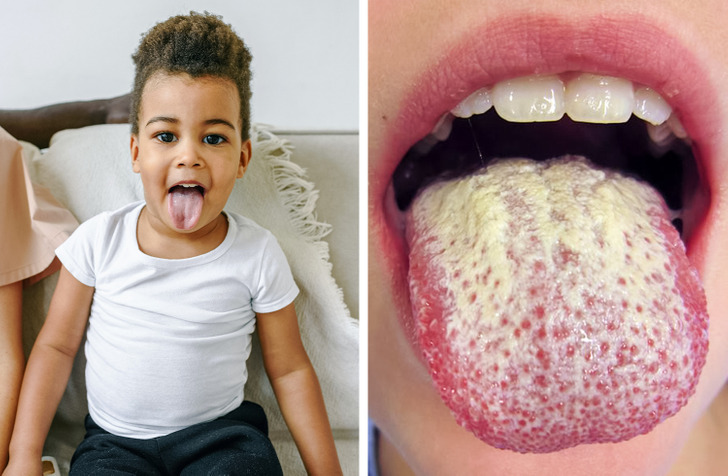
The white film may cover the entire tongue, part of it, or appear as spots. At the same time, an unpleasant odor and taste in the mouth may appear. It looks as if there are small white hairs on the tongue’s surface. In fact, they are buds covered with organic particles, bacteria, and dead cells.
White plaque on the tongue (which can also be yellow) may appear for different reasons, like due to irritation or because of an infection. It usually disappears after several days. If the situation doesn’t change for several weeks, and it’s painful to eat and talk, it’s best to see a doctor.
It’s important to note that the plaque may not only be white. While a pink tongue is normal, a brown tongue means the person drinks too much coffee or tea. A yellow tongue means there’s something wrong with the liver, and a red tongue is a sign that the person lacks vitamin B.
Why the tongue becomes white
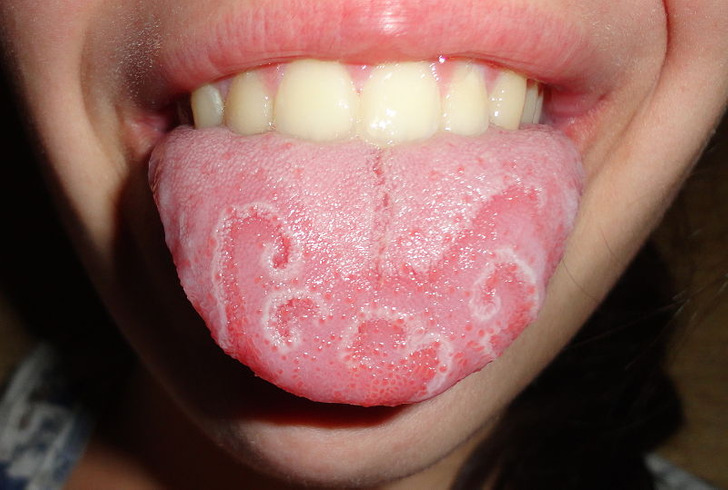
Usually, the tongue becomes white due to bacteria, leftover bits of food, or dead cells that get stuck in between the buds. Because of this, the buds may increase in size or become inflamed. This is how white spots on the tongue’s surface appear.
Sometimes, the plaque appears due to an illness. For example, the geographic tongue is also a condition where white spots appear on the tongue. It’s quite rare, and the causes are unknown, but the condition itself is often connected to eating foods that irritate the tongue. It may also be a reaction to stress, an illness, or hormonal changes.
Why white plaque appears on the tongue
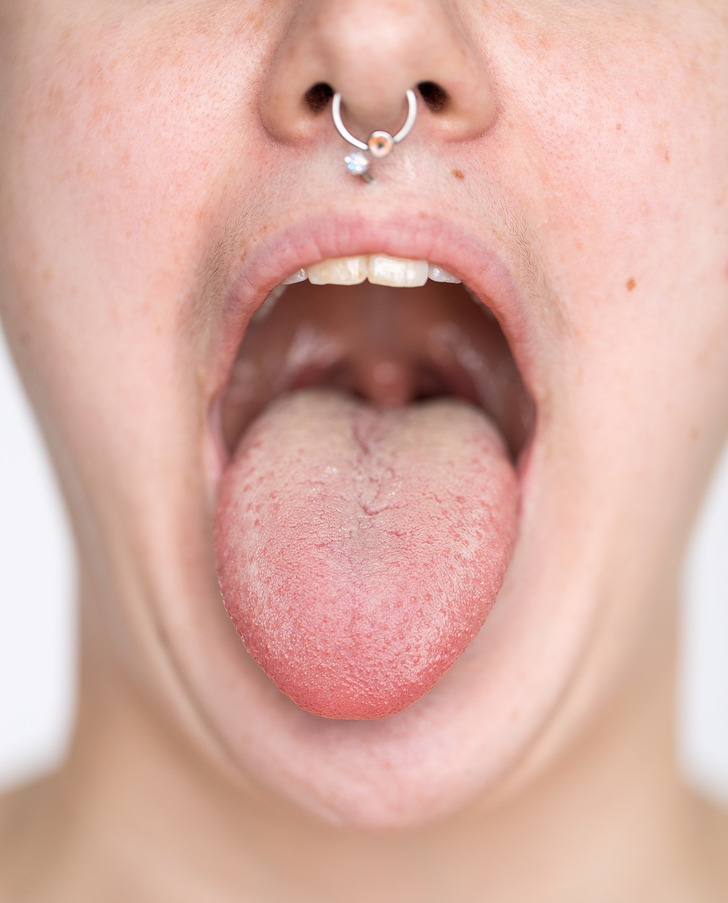
There are some things that make the appearance of white plaque on the tongue more probable:
- Age
- Taking antibiotics (white-yellow plaque appearing when there’s a fungal infection in the mouth)
- A diet that’s lacking enough fruits, vegetables, vitamin B12, and iron
- A weak immune system
- Bad mouth hygiene
- Dental prosthetics or other objects that can damage the tongue
- Dehydration and mouth dryness
What piercings have to do with white tongue
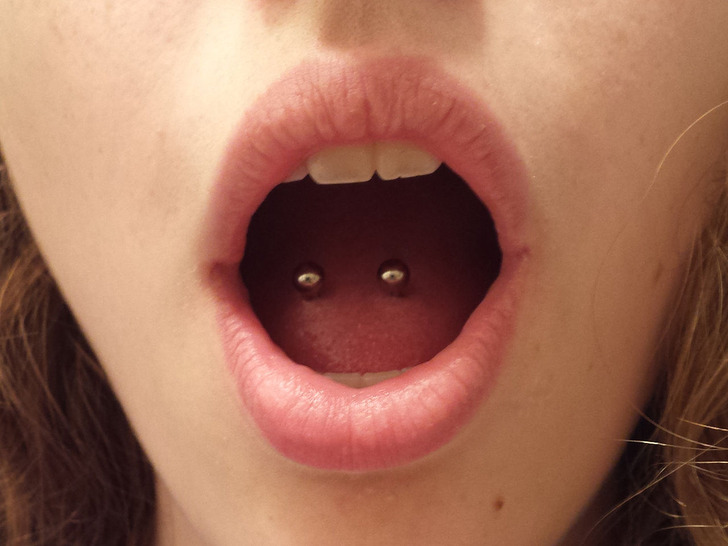
Right after piercing the tongue, there might be some white film present. This happens because the number of bacteria on the tongue increases, and it’s normal. Antibacterial mouthwash will help you get rid of it. Plus, there might be a ring around the piercings, which is normal too, and it means the tissue is healing.
If the plaque appears due to an injury (including piercings), the healing should take around 1.5 weeks. You should avoid irritants, such as hot, spicy, or sour foods and drinks.
How to get rid of white tongue at home
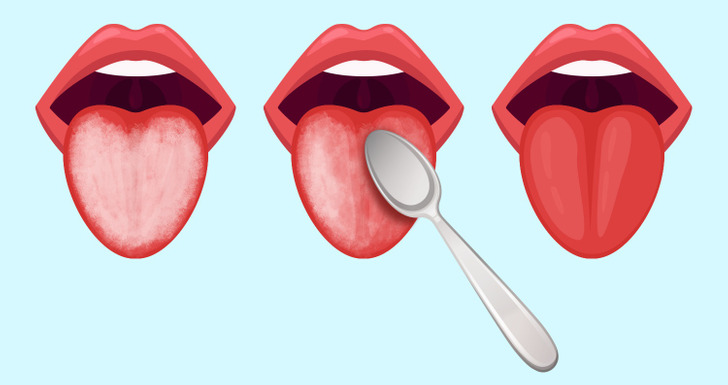
- Practice good mouth hygiene.
- Drink enough water.
- Brush your teeth using a soft toothbrush.
- Use a mild fluoride toothpaste — one that doesn’t contain sodium lauryl sulfate.
- Use fluoride mouthwash.
- Brush your tongue or use a tongue scraper to remove the white coating.
- Drink cold drinks through a straw.
- Avoid food and drinks that are spicy, salty, acidic, or very hot in temperature.
Who to talk to if you’re worried about your white tongue
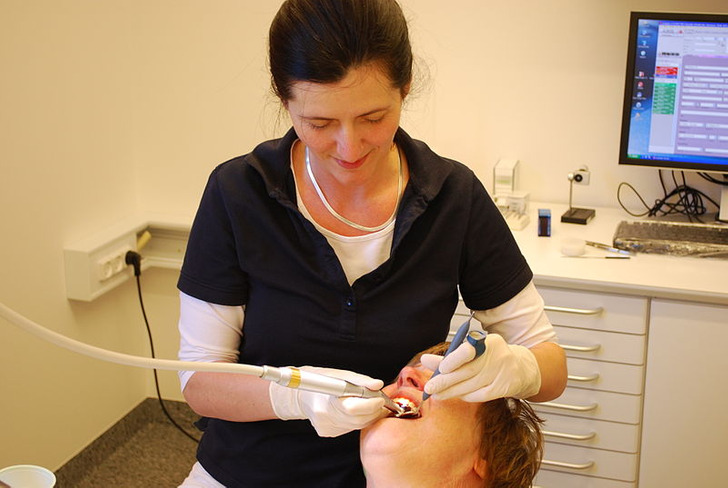
- Your dentist can help you remove the white film from the tongue and prescribe medications if needed.
- Your GP can diagnose the tongue, prescribe you certain medications and determine if the white tongue is an indicator of a more serious issue.
What do you do about white tongue?
Preview photo credit Genusfotografen (genusfotografen.se) & Wikimedia Sverige (wikimedia.se) / Wikimedia Commons, CC BY-SA 4.0, Martanopue / Wikimedia Commons, CC BY-SA 3.0
We Sent Money to Our Son for College Tuition – One Day, We Discovered He Wasn’t Even Enrolled and Lived in an Old Trailer

As parents, we’d always believed in our son. He was the perfect child—brilliant, and destined for greatness. So when we sent him off to college with thousands of dollars for tuition, we never questioned his progress. Until the day we found out he had been lying to us all along.
From the moment Jason was born, he was our pride and joy. Growing up, he wasn’t just “our son”; he was the son every family in the neighborhood admired. He excelled at everything he touched.

Boy receiving an award in school | Source: Midjourney
Straight A’s? Easy. Captain of the basketball team? Of course. And his charm? It was magnetic. Parents would nudge their kids, saying, “Be more like Jason.” He was handsome, polite, and ambitious. At least, that’s what we thought.
For as long as I can remember, Jason always had a soft spot for animals.
If a stray cat wandered into the yard, it was Jason who would sneak it milk. When our dog, Max, got sick, Jason stayed up all night by his side, even though he was only eight.

Young boy bonding with his dog | Source: Midjourney
“Mom, I want to help animals when I grow up,” he said once, eyes gleaming as he watched Max wag his tail weakly.
“I want to be like Uncle Tom,” he insisted.
I remember laughing softly, tousling his hair. “That’s sweet, honey, but you can help more people if you become a businessman like your dad.”

Young boy bonding with his dog while chatting with his mom. | Source: Midjourney
My husband, Daniel, and I had always envisioned Jason as the future head of our family business. He had all the qualities of a leader.
So, when the time came to choose a college, we insisted on management. Jason hesitated at first, but eventually, he agreed. I thought we had his future all mapped out.
I couldn’t have been more wrong.

Boy standing at a college building | Source: Midjourney
It started innocently enough. Jason was two years into college, supposedly studying business management at a prestigious university. We sent him money every month for tuition and living expenses.
Life was busy for Daniel and me; running a company doesn’t leave much room for doubt. So, we never questioned anything.
But then, everything unraveled.

Woman in her car, talking on the phone | Source: Midjourney
A business trip took me to the city where Jason’s college was located. I was excited to surprise him. “I’ll swing by his dorm, maybe take him out to dinner,” I told Daniel over the phone.
When I arrived at the admissions office to get his dorm address, the woman behind the counter gave me a confused look. “Jason Reed? I’m sorry, but we don’t have anyone by that name enrolled here.”
I froze, sure there was some mistake. “Check again,” I insisted, my voice trembling.
She checked. And then she checked again. “I’m sorry, ma’am, but there’s no record of a Jason Reed. Are you sure this is the right university?”

Woman talking to a receptionist | Source: Midjourney
My stomach turned. I thanked her stiffly and left the office, my mind racing.
I called Jason immediately. “Hey, Mom!” he answered, cheerful as ever.
“Hi, sweetheart,” I said, forcing my voice to stay steady. “I’m in town for a meeting and thought I’d surprise you. How about coffee?”
There was a pause. “Uh, yeah, sure! Let’s meet at the café near campus.”
Something was off, but I brushed it aside. When I saw him at the café, he looked as polished as ever—relaxed, confident, and full of that same charm that had everyone fooled.

Mother and son at a coffee shop | Source: Midjourney
“How’s school?” I asked casually.
“Great! Classes are tough, but I’m learning a lot,” he said without missing a beat. “Midterms are coming up, so I’ve been studying nonstop.”
He lied so smoothly, that I almost believed him. But the admissions clerk’s words echoed in my head. He’s not enrolled here.
When we hugged goodbye, I slipped my fitness bracelet into his jacket pocket. It had GPS. If Jason was lying to me, I needed to know where he was really going.

Mother and son hugging | Source: Midjourney
That evening, I followed the bracelet’s signal. It led me far from campus, away from the bustling city, to the outskirts of town. The smooth tarmac gave way to a dirt road lined with towering trees. The GPS beeped faster as I approached a small clearing.
And there it was—a rusty old trailer, half-hidden among the trees. The roof sagged under the weight of mismatched patches, and the whole place looked like it might collapse in a strong wind.

An old trailer in the woods | Source: Midjourney
I parked my car and waited, gripping the steering wheel so tightly. Ten minutes passed before Jason appeared, walking up the dirt path with a bag slung over his shoulder.
My heart stopped.
I watched as he knocked on the trailer door. When it creaked open, another figure stepped out. It was my brother, Tom.
“Tom?” I whispered to myself, shocked. I hadn’t seen him in over a year. Tom, had always been a wanderer. While Daniel and I built a stable life, Tom flitted between jobs but finally became a veterinarian.

Man standing at the door of an old trailer | Source: Midjourney
Without thinking, I got out of the car and marched toward the trailer.
“Jason!” I called, my voice sharp.
He spun around, eyes wide. “Mom?! What are you doing here?”
“I should be asking you that!” I yelled. “What is this place? Why aren’t you at school? And why is he here?”
Tom leaned against the doorframe, smirking. “Nice to see you too, sis.”
“Stay out of this, Tom,” I snapped, glaring at him.
Jason stepped forward, hands up. “Mom, I can explain.”

Son explaining himself to his mother | Source: Midjourney
“No,” I interrupted, my voice trembling. “I’ve been sending you money—our money—for tuition, thinking you were in college. Were you ever enrolled?”
Jason hesitated, then shook his head. “No.”
The word hit me like a slap. “Then where has all the money gone?”
Jason glanced at Tom, then back at me. “I’ve been using it to fund something…important. Uncle Tom’s been helping me.”
My gaze snapped to Tom, who looked unbothered. “Helping you do what?”

Man standing at the door of an old trailer | Source: Midjourney
Jason took a deep breath. “I’m building a veterinary clinic.”
“What?”
“I’ve been dreaming about this my whole life, Mom. Uncle Tom had the skills and connections to help me get started. I’m using the money to buy equipment and renovate a building nearby. Once it’s ready, he’s going to be the head vet.”
I couldn’t believe what I was hearing. “You lied to us! You’ve been funneling money to this—to him?” I pointed at Tom, whose smirk only deepened.
“Mom, this is my calling,” Jason said, his voice steady. “You and Dad wanted me to take over the business, but that’s not who I am. I want to help animals.”

Son talking to his mom | Source: Midjourney
“You betrayed us!” I shouted, my voice cracking. “You’ll never see another penny from me again.”
I turned and stormed back to my car, tears blurring my vision.
Three months passed, and I didn’t speak to Jason. The silence was unbearable, but I couldn’t bring myself to call him. Then, one day, an envelope arrived in the mail.
The letter read: “Dear Mrs. Reed, Thank you for believing in your son and financing his veterinary clinic. Recently, my dog was hit by a car, and your son saved her life. If it weren’t for him—and for you—she wouldn’t be here today.”
I stared at the letter, my hands shaking.

Woman reading a letter | Source: Midjourney
Over the next few weeks, more letters and emails poured in. Each one told a similar story: animals saved, families reunited, lives changed—all thanks to Jason.
I couldn’t take it anymore.
One night, unable to sleep, I found myself searching for Jason’s Veterinary Clinic online. The result popped up instantly, complete with photos of a small building with bright green awnings and a cheerful sign. My breath caught when I saw Jason in the photo, smiling beside a family and their golden retriever.
I grabbed my keys.

Woman’s hand grabbing car keys from the table | Source: Midjourney
The clinic looked just like the pictures. The parking lot was busy, the hum of life evident in the barking of dogs and the chatter of pet owners. My legs felt like jelly as I walked to the front door.
Inside, the first person I saw was Tom. He looked up from a clipboard and froze.
“Well, if it isn’t my sister,” he said, raising an eyebrow. “To what do we owe the honor?”
“I got your messages,” I said, holding back tears.
“My messages?” He smirked, crossing his arms. “Oh, you mean the flood of letters from people thanking you for something you tried to stop.”

Veterinary doctor having a conversation with his sister in his office | Source: Midjourney
I flinched, but he didn’t stop.
“You wrote him off, but look around.” He gestured to the clinic bustling with life. “This is Jason. This is what you didn’t see. You were so busy planning his life, you never stopped to ask what he wanted.”
“Where is he?” I asked, ignoring the sting of his words.
Tom nodded toward a back room. “Go see for yourself.”

Veterinary doctor talking to his sister in his office | Source: Midjourney
On the other side, Jason bent over an examination table, gently examining a scruffy dog while speaking softly to a tearful woman.
“Mom?” he said, noticing me. His voice held equal parts surprise and fear.
I didn’t speak at first, the lump in my throat too heavy. Finally, I managed, “You did this?”
Jason nodded slowly. “Yeah. I did.”
His confidence wavered as he spoke. “I know I hurt you. I know I lied, but—”
“Jason,” I interrupted, my voice breaking. “I was wrong.”
He blinked.

Mother and son having a conversation | Source: Midjourney
I took a shaky step forward. “This is your calling. It’s everything you said it was. And I couldn’t see it. I tried to control you, to make you into someone you weren’t, but…” My voice cracked. “You’ve built something beautiful. Something that saves lives. I’m so proud of you.”
Jason’s eyes glistened as he stepped toward me. “That means everything, Mom.”
Behind us, Tom’s voice rang out, amused but warm. “Look at that. Turns out we were right all along.”
I turned back to Jason, my heart finally at peace.
“Promise me one thing,” I said.
“Anything,” he replied.
“Don’t ever stop being this person.”

Young veterinary doctor talking to his mother | Source: Midjourney
If you enjoyed this story, you might love this one too: My stepmom took $5,000 from my college fund for her veneers — then karma struck back.
This work is inspired by real events and people, but it has been fictionalized for creative purposes. Names, characters, and details have been changed to protect privacy and enhance the narrative. Any resemblance to actual persons, living or dead, or actual events is purely coincidental and not intended by the author.
The author and publisher make no claims to the accuracy of events or the portrayal of characters and are not liable for any misinterpretation. This story is provided as “is,” and any opinions expressed are those of the characters and do not reflect the views of the author or publisher.

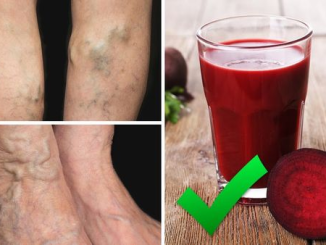

Leave a Reply